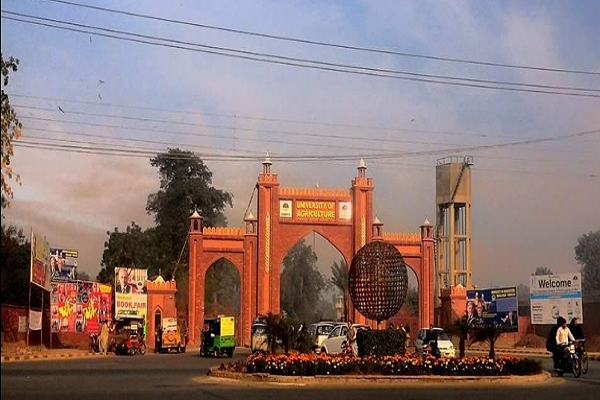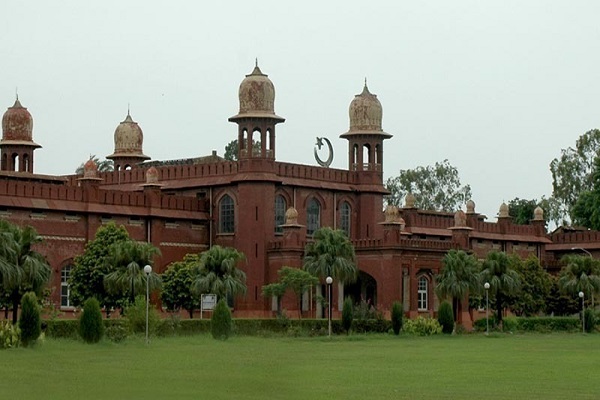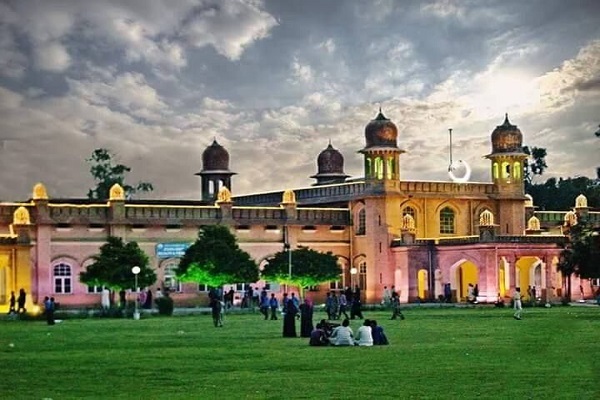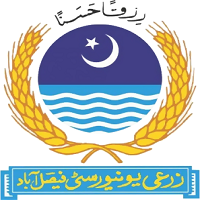The UAF (University of Agriculture Faisalabad) is a public sector research university located in Faisalabad. It is South Asia’s pioneer and oldest Agricultural Institute. The university is offering BSc, BA, BSc (Hons.), B.Ed., M.Ed., MSc (Hons.), M.Phil., MSc, and Ph.D. programs.
University of Agriculture Faisalabad admissions are done both on a merit and self-finance basis. Currently, thirty-five thousand students are enrolled in UAF and Professor Iqrar Ahmed is serving as its Vice-Chancellor.

Table of Contents
University of Agriculture Faisalabad History
The UAF was founded in undivided Punjab in 1906 as 1st major institute of agricultural education. Pakistan was an agricultural country at the time of independence. Agriculture continues to be the backbone of the country’s economy despite subsequent development and industrialization.
After independence in 1947, the Pakistani Government made a National Commission on Food & Education to improve the existing system of agriculture and make policies for maximizing agricultural potential. The commission argued in favor of establishing an agricultural university for education and research. The Punjab Agricultural College & Research Institute was upgraded in 1961 to transform it into an agricultural university.
Sir Louis Dane, Lieutenant at that time and Punjab Governor laid the foundation stone for the 1st university established by the British Government in 1906. The campus is spread on an area of 1,950 acres. The new campus is surrounded by lush green plants and its monolithic blocks are constructed in a modern style. The old campus is a symbol of traditional and skilled Muslim architecture.
Faculties and Departments
UAF has seven faculties, eleven institutes, and twenty-nine departments.
1- Faculty of Agriculture
This faculty is the largest in UAF both in terms of students’ strength and infrastructure. The faculty train students practically and strengthens its research projects through farms, PARS (Post-Graduate Agricultural Research Station), Computer Lab, Meteorology Cell, Clinic for Plant Health, and SARC (Saline Agricultural Research cell).
The syndicate hall in the faculty is mostly used for arranging meetings with alumni, stakeholders, and farmers. A four-year degree program BSc Hons Agriculture Sciences is offered at this faculty. During the 1st four semesters of this degree, students are taught common courses and after completing four semesters they have to choose a major before the start of the fifth semester.
Departments in the Faculty of Agriculture
- Agronomy
- Entomology
- Plant Pathology
- Crop Physiology
- Forestry and Range Management
- Plant Breeding and Genetics
Institutes in the Faculty of Agriculture
- Soil & Environmental Sciences
- Horticultural Sciences

2- Faculty of Veterinary Science
Since 1962, the faculty is working for boosting the production of poultry and livestock. Until now, the faculty has trained 180 PhDs, 2974 M.Phil. or MSc (Hons.) and 3853 DVM (Doctor of Veterinary Medicine) graduates. Animals are treated at the Animal Reproduction clinic and Veterinary Hospital, which also deals with gynecological issues.
The clinical researchers have started outreach programs in several villages with mobile clinics. Pharmacologists have conducted researched on medicinal plants and have introduced several herbs having antiulcer, hepatoprotective, antidiabetic, and antibiotic activities.
Departments in the Faculty of Veterinary Science
- Pathology
- Anatomy
- Parasitology
- Pharmacy
- Theriogenology
- Clinical Medicine and Surgery
Institutes in the Faculty of Veterinary Science
- Physiology & Pharmacology
- Microbiology
3- Faculty of Sciences
When a new educational policy was introduced in 1974, the Faculty of Sciences was established. It has nine departments and is currently the University’s second-largest faculty. This faculty is offering MSc and M.Phil. degree programs in the fields of Botany, Biochemistry, Computer Science, Chemistry, Physics, Zoology, and Fisheries and Statistics.
Additionally, Ph.D. degree programs are offered in the fields of Chemistry, Botany, Zoology and Fisheries, and Biochemistry. MBA (Regular/Executive), M. Com, and MBIT degrees are also offered.
Departments in the Faculty of Sciences
- Chemistry
- Botany
- Biochemistry
- Computer Science
- Physics
- Zoology, Fisheries & Wildlife
- Islamic Studies
- Mathematics & Statistics
- Humanities & Linguistics
4- Faculty of Animal Husbandry
The Faculty is offering thirty-nine courses at undergraduate and thirty-nine courses at the post-graduate level in addition to short courses. The degree programs including BSc (Hons.) Dairy Science and BSc (Hons.) Animal Sciences are offered in this faculty.
Students of Food Sciences, BSc (Hons.) Agri., and DVM could also enroll in supporting courses here. The faculty comprises four departments and all of these departments are offering MSc and Ph.D. leading post-graduate programs.
The Faculty’s mission is to modernize poultry and livestock farming to increase the production of animal-derived fiber and food, benefiting both the farmers and the country. There is an ASIT (Animal Science Information Technology) Lab to facilitate students’ learning.
Departments in the Faculty of Animal Husbandry
- Animal Breeding & Genetics
- Animal Nutrition
- Livestock Management
- Poultry Science
Institutes in the Faculty of Animal Husbandry
- Animals & Dairy Sciences

5- Faculty of Agricultural Engineering and Technology
In 1961 the elevation of Punjab Agriculture College to the status of Agriculture University, Lyallpur led to the establishment of the Faculty of Agricultural Engineering and Technology. The faculty was particularly founded to train laborers to meet the increasing demands of mechanized agricultural practices in Punjab.
The coursework taught here leads to BSc in Food Engineering, Agricultural Engineering, Textile Technology; MSc in Fiber Technology, Food Technology and Agricultural Engineering, and Ph.D. in Agricultural Engineering and Food Technology.
Departments in the Faculty of Agricultural Engineering and Technology
- Farm Machinery & Power
- Irrigation and Drainage
- Food Engineering
- Fiber & Textile Technology
- Structures and Environmental Engineering
- Energy Systems Engineering
6- Faculty of Social Sciences
It was established in 1963 and was known as the Faculty of Agricultural Economics and Rural Sociology. In 2012, it was restructured and was named the Faculty of Social Sciences. In the past few years, it has responded timely and dynamically for the improvement of rural populations, need-based curriculum development, and greater food security.
The members are highly qualified and most of them have earned Ph.D. degrees from recognized institutes.
Departments in the Faculty of Social Sciences
- Rural Sociology
- Continuing Education
Institutes in the Faculty of Social Sciences
- Business Management Sciences
- Agricultural and Resource Economics
- Agricultural Extension and Rural Development
7- Faculty of Food Nutrition and Home Sciences
It is aimed at providing quality education to its students and developing innovative techniques to combat national and international challenges in human nutrition, food safety, and food security. NIFSAT (National Institute of Food Science & Technology) at UAF is the 1st and only Institute of Food Science and Technology in Pakistan.
NIFSAT is primarily focused on applying the principles of Food Sci. and Tech in food preservation processing, and handling to meet the demands of the rapidly expanding food industry. The Home Sciences Institute is working in the field of Science & Humanities for the achievement of well-being and welfare of the family.
Institutes in the Faculty of Food Nutrition and Home Sciences
- NIFSAT (National Institute of Food Science and Technology)
- Home Sciences

University of Agriculture Faisalabad Programs
Diploma and Certificate courses
The university is offering the following diploma programs for boys and girls:
- Diploma in the Arabic Language
- Livestock Assistant Diploma
- Poultry Assistant Diploma
- Post-Graduate Diploma in Food Science
- Diploma in Computer Science
- Mali Class
- T. Agri.
- Diploma for Girls in Rural Home-Economics
Agriculture University Faisalabad Courses
Some of the short courses that UAF offers are:
- Spoken English
- Tree Plantation
- Poultry Health
- Bee Keeping
- Word Processing
- Tunnel Farming
- Fish Farming
- Hand Knitting
University of Agriculture Faisalabad Admissions
UAF admission news is published in newspapers and is also posted on its website. Students can check the website to get details about eligibility criteria, the number of available seats, last date of admission, entry test dates, and entry test results. University of Agriculture Faisalabad merit lists are also uploaded on its official website.
University of Agriculture Faisalabad Fee Structure
The University of Agriculture Faisalabad fee structure depends on degree level i.e., undergraduate, postgraduate, border and non-border status, morning or evening program, and department. The fee structure is revised from time to time.
General Fee Structure
- BSc (Hons.)
Non-Boarder-Rupees 23,100/semester
Boarder-Rupees 33,600/semester
- MSc (Hons.)
Non-Boarder-Rupees 36,500/semester
Boarder-Rupees 46,900/semester
- Phil.
Non-Boarder-Rupees 36,500/semester
Boarder-Rupees 46,900/semester
- PhD
Non-Boarder-Rupees 53,200/semester
Boarder-Rupees 63,200/semester
University of Agriculture Faisalabad Sub Campuses
1- Okara Sub-Campus
The district Okara is highly recognized for its agricultural production, especially potato and maize crops. Keeping in view this agricultural potential of the district a sub-campus of UAF was established in Okara. This sub-campus is spread on an area of seventy-seven acres.
2- Toba Tek Singh Sub-Campus
On 5th June 2005. Toba is 2nd biggest poultry hub. So, it was the need of the hour to disseminate poultry education to farmers and produce highly-qualified poultry science professionals. So, a sub-campus of UAF was established in Toba Tek Singh on 5th June 2005.
3- Burewala Sub-Campus
This sub-campus of UAF was founded in district Vehari in order to spread agricultural research throughout Pakistan, particularly in Punjab’s southern region.
University of Agriculture Faisalabad Achievements
- In 2015, the Higher Education Commission ranked the University of Agriculture Faisalabad first in the discipline of Agriculture & Veterinary Sciences and overall fourth in Pakistan.
- Shanghai Ranking 2019 ranked it at 127 in the fields of life science & agricultural science.
- In terms of research power, the university ranked among the top five institutes in Pakistan.
University of Agriculture Faisalabad Address
UAF is located near Al-Khidmat Police Markaz at Jail Road, Faisalabad.
Frequently Asked Questions
Is Agriculture University private or government?
UAF is a government sector institute.
Which programs are offered by Agriculture University Faisalabad?
UAF is offering BSc, BA, BSc (Hons.), B.Ed., M.Ed., MSc (Hons.), M.Phil., MSc, and Ph.D. programs.
How many marks are required for admission in UAF?
50% marks in intermediate are required for admission in BSc (Hons.) and 2.5 CGPA is required for taking admission in M.Sc. (Hons.)/ M.Phil. The candidates applying for the Ph.D. program have to clear GRE with 70 percent marks.
How can I get admission in Agriculture University?
After the admissions are opened, one can apply for admission both by visiting the university or through the online admission portal of the university. The candidate has to fill out the application form, submit the entry test fee to the bank mentioned, appear in the entrance test conducted by the university, attach all documents with the filled application form, and submit in the admission office at the university.
Which documents are required for admission in UAF?
Attested photocopies of the student’s CNIC, father’s CNIC, result cards of the previous degree, domicile, passport size photographs, and affidavits are required for UAF admission.
